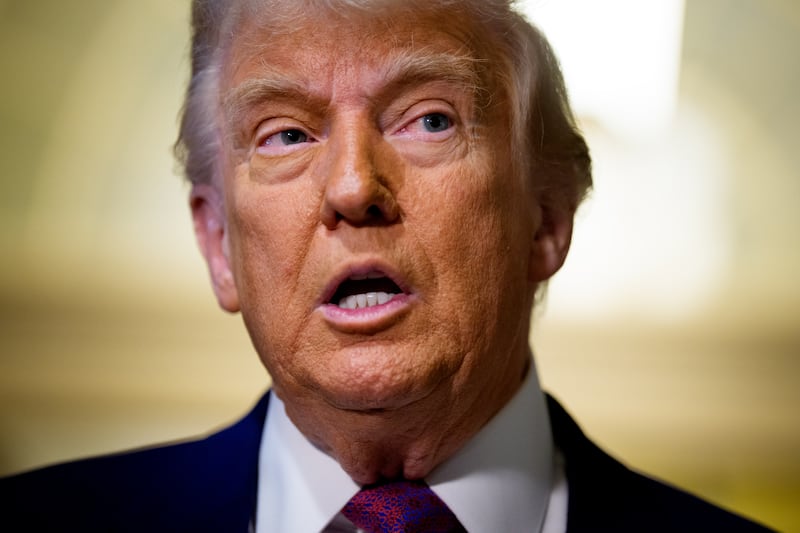King Charles III threw shade at President Donald Trump during a historic Tuesday speech in Ottawa, vowing that Canada would remain “strong and free.”
The king, who was there to welcome a new parliament, took advantage of the rare opportunity—only the third time a monarch has delivered the speech—to reinforce Canada’s sovereignty.
“Democracy, pluralism, the rule of law, self-determination, and freedom are values which Canadians hold dear and ones which the government is determined to protect,” he said in the speech written by the Canadian government.
Charles, 76, said that his country “faces another critical moment” in its long history in defending democracy and remaining a force of peace in the world.
Even amid Trump’s trade war against Canada and his wish for the country to become America’s 51st state, Charles said there was no reason for alarm.
“We will unleash a new era of growth that will ensure we don’t just survive the ongoing trade wars, but emerge from them stronger than ever,” he said.
Charles recognized that many Canadians feel anxious and uneasy in today’s “fast-evolving world,” but he promised that “Canada is ready to lead.”
“A confident Canada,” Charles said, “can recognize that all Canadians can give themselves far more than any foreign power on any continent can ever take away.”
The king pushed for Canada to connect with countries that “believe in international co-operation” and the “free and open exchange of goods, services, and ideas.”
Charles’ reminder comes as Trump grapples for a throne of his own. In February, he posted an AI-generated illustration of himself in a crown with the caption: “LONG LIVE THE KING!”
Trump has talked about stripping Canada of its independence since taking office in January. He’s also placed tariffs on Canadian products that have rocked the country’s economy and exacerbated the cost-of-living crisis.
Charles’ visit to Ottawa marked a monarch’s first throne speech to Canada’s Parliament since 1977, when his mother Queen Elizabeth II did the same to mark the 25th anniversary of her reign. The king dedicated part of his speech to outline the priorities of Prime Minister Mark Carney’s new government.
Carney has suggested that the relationship between the U.S. and Canada is of paramount importance.

“The prime minister and the president of the United States, for example, have begun defining a new economic and security relationship between Canada and the U.S., rooted in mutual respect and founded on common interests, to deliver transformational benefits for both sovereign nations,” Charles said.
Charles is the head of the Commonwealth, which is a group of 56 independent countries (and 2.5 billion people). He is the head of state for 15 of these “Commonwealth realms,” which include the United Kingdom. The others are Australia, Antigua and Barbuda, the Bahamas, Belize, Canada, Grenada, Jamaica, Papua New Guinea, St. Christopher and Nevis, St. Lucia, St. Vincent and the Grenadines, New Zealand, Solomon Islands, and Tuvalu.
Charles’ main powers as head of state are to appoint the Prime Minister and other ministers, give royal approval to laws passed by parliament, and open new sessions of parliament, which he did in Canada Tuesday.
He arrived to the Senate in a horse-drawn carriage, escorted by 28 riders from the Royal Canadian Mounted Police. Upon arriving, he inspected an honor guard, all donning red uniforms.
The king wore the Order of Canada around his neck—a six-pointed star-shaped award with a red maple leaf at the center—as he expressed gratitude for “the country that Canadians and I love so much.”
“Every time I come to Canada... a little more of Canada seeps into my bloodstream–and from there, straight to my heart,” he added as his wife Queen Camilla sat loyally by his side.
Trump has said he will use “economic force” to merge the U.S. with Canada, igniting a wave of Canadian nationalism across the country. His assaults are the biggest threat to Canadian sovereignty since 1812, when the U.S. launched ten land incursions into Canada before both countries signed a peace treaty in 1815.
In the early 19th-century war, American armies repeatedly invaded Canada but ultimately failed miserably. Despite ambitious plans for U.S. expansion, their attempts to conquer Canada were quickly squashed by the British Army and Navy.
Charles ended his speech by referring to the Canadian national anthem, as the Senate erupted in applause.
“The True North is indeed strong and free,” he said.





